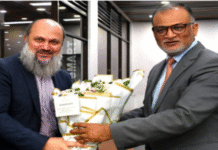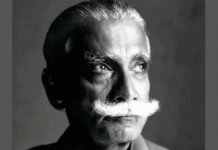Irregularities in distribution of subsidised food items among the poor continue mainly due to political interference in selection of dealers though the government has apparently taken a tougher stance to stop such malpractices amid the coronavirus outbreak.
Most of the dealers selected for distributing food items under the food ministry’s Special OMS (Open Market Sale) and the Food Friendly programmes have ties with local ruling party leaders, say a number of government officials.
Though irregularities in food distribution under the two programmes are nothing new, a good number of cases of misappropriation of subsidised food items came to light recently due to the proactive role of local administration and law enforcement agencies in different parts of the country, they said.
The administration and the agencies swung into action following Prime Minister Sheikh Hasina’s strong warning against misappropriation of food items meant for the poor who are going through a very difficult time due to the coronavirus outbreak, they mention.
Besides, many of the aspiring candidates for the union parishad polls slated for early next year are keeping a close eye on food distribution in their respective areas and are informing the local administration of anomalies in the programmes, they point out.
They also seized 6,480 litres of soybean oil, 18 sacks of sugar, and 25 sacks of chickpea.
In most cases, local ruling party leaders were found involved in the theft of the food items, the reports show.
Amid allegations of rice misappropriation, the government suspended the Special OMS Programme on April 15, and decided to issue cards for low-income people across the country so that they can buy rice for Tk 10 a kg.
Earlier on April 5, the food department launched the Special OMS programme so that low-income people can buy rice for Tk 10 a kg amid the countrywide shutdown.
The other one, the Food Friendly Programme, was introduced in 2016. Under the programme, 50 lakh families buy 30kg rice a month for Tk 10 a kg.
POLITICAL INFLUENCE
Food items under these programmes are distributed by dealers, and this is where irregularities start.
Though there is a committee, led by upazila nirbahi officer, in every upazila and a set of criteria for selecting a dealer for these food programmes, recommendations from local lawmakers or ruling party leaders are the main “yardstick” for the selection, say a number of dealers and officials.
“Political consideration is certainly there… We get flooded with recommendations from local political leaders once we start the process of selecting dealers for these programmes,” said a UNO of an upazila in Barishal Division.
And this is not a secret.
In October 2017, the parliamentary standing committee on the commerce ministry suggested giving dealership of the Trading Corporation of Bangladesh to individuals as per lawmakers’ recommendations to ensure “accountability and transparency”.
The TCB dealers also sell food items under the OMS Programme, and most of them are either involved with the ruling party or have ties with local lawmakers and ruling party leaders, said local officials.
“Small as well as big traders get dealership, using their political links… Recommendations from local lawmakers are very important here,” said an assistant commissioner (land) of an upazila under Rangpur Division.
Local public representatives, including upazila chairmen, union parishad chairmen and members have links with these dealers, said the official seeking anonymity.
“Whenever any theft or misappropriation of food items takes place, it becomes difficult to deal with.
“They [local representatives] often try to legalise the dealers’ illegal activities for their vested interest.”
Each union has three to four dealers, and they hold dealership for years unless serious allegations of corruption are brought against them, a secretary of a union parishad in Lalmonirhat told this newspaper.
“Recommendations from local MPs and political leaders are a must for getting dealership.”
Babul Das, a dealer in Khulna city’s Railgate area, said a section of dealers sell rice, allocated under the government food programmes, in the wholesale market, instead of selling it to low-income people, as it is more profitable.
“A dealer gets 50 to 75 paisa from the sale of per kg rice under the Special OMS Programme. But if the dealer sells rice in the wholesale market, the profits soar exponentially.”
A number of government officials said dealers also misappropriate food items by keeping the local food offices in the dark about the unsold goods, and in some cases, they do it in collusion with a section of local food officials.
WHAT FOOD MINISTRY DID?
Instead of looking into the problem regarding selection of dealers, the food ministry and the minister wrote to local administration and police several times, asking them to stop irregularities and take action against the culprits.
But it didn’t help, and the ministry had to suspend the Special OMS Programme last week, leaving the low-income people in deep trouble.
Following media reports, the food ministry on April 13 formed a three-member committee, led by an additional secretary, to investigate the misappropriation of a huge amount of rice and give recommendations.
The same day, the food minister asked the director general of Directorate General of Food to probe whether any of its officials were involved in the irregularities.
WHAT AUTHORITIES SAY
Contacted, Food Minister Sadhan Chandra Majumder said they already instructed all deputy commissioners and others involved in the selection of dealers to take punitive measures, including cancellation of dealership and confiscation of security money, if any dealer is found involved in irregularities in food distribution.
“We have also asked them to replace the dishonest dealers with the good ones.”
Asked about the selection of dealers on the basis of political affiliation, the food minister said, “We have asked the authorities concerned to strictly abide by the guidelines while selecting dealers.”
The DCs and others concerned have been asked to prepare a list of vulnerable families within five days to provide each family with 20 Kg rice a month, he mentioned.
Besides, the food ministry will continue the Food Friendly Programme in May to provide 30 kg rice a month to each of 50 lakh poor families.
The programme is usually run from March to April, and from September to November.
Agriculture Minister Abdur Razzaque said the government will be tougher, if necessary, to stop irregularities in food distribution.
“We thought no one would resort to foul play at this time of grave crisis. But since some people are doing it even at this time, the government will take harsher action against them.”
Mozibor Rahman, convener of the three-member probe body and also an additional secretary of the food ministry, said they found a lack of proper monitoring regarding the food programmes.
A government official is supposed to monitor distribution of subsidised food items in a particular area, but many of the officials failed to do so amid the coronavirus scare, and a number of dealers took advantage of it, he told this newspaper yesterday.
He further said they got complaints of irregularities from all divisions, but could not give the number of dealers facing allegations of misappropriation.
Replying to another question, he said they had not so far found involvement of any officials in these irregularities.
The official stressed the need for strict monitoring and putting the names of all cardholders under the Special OMS Programme on government websites to ensure transparency.
He said they will recommend some changes in the guidelines for running the food programmes.
Talking to The Daily Star, Hafizuddin Khan, former adviser to a caretaker government, said the government must take punitive action against the corrupt dealers, irrespective of their party affiliation, to stop irregularities in food programmes.










